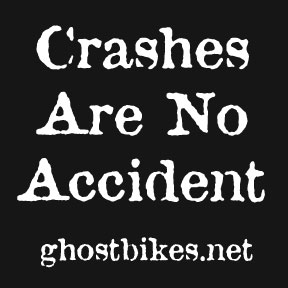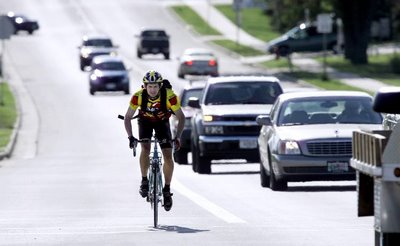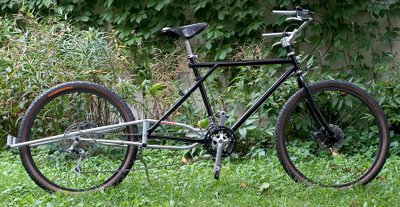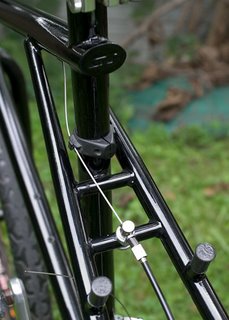There's a problem with the way we talk about incidents where a vehicle collides with something, causing damage, injury or death. The problem is that we call such an event an "accident." Why would I think this a problem? Madison's longtime bicycle-pedestrian coordinator explains:
Dictionary definitions aside, the common connotation of the term accident is something that was unavoidable, unplanned, unpredictable, unpreventable, etc. In common usage, the term accident implies that no one was responsible for what happened. Most traffic crashes, however, are both predictable and preventable.
[...]
Calling these incidents crashes or collisions allows us to get away from the blamelessness that the term accident implies, and get on with the task of addressing the human behaviors that lead to these occurrences on a predictable basis so that they can be prevented.
He goes on to point out that the State of Wisconsin has recognized this mistake a long time ago:
Wisconsin DOT statistics indicate that something on the order of 80% + of reported traffic accidents are caused by driver error. In the 1989 edition of Wisconsin Traffic Accident Facts, at the bottom of page 1, is the following:Accidents to be called Crashes
Traffic crashes are not accidents, but avoidable events caused by a single variable or chain of variables. We are dedicated to reducing traffic injuries and fatalities by addressing the factors that cause them. During this transition year, the 1989 edition of Accident FACTS uses the term "accident." Future editions will incorporate "crash" into the text and will be entitled Crash FACTS.
Here's an example of how crashes are not accidents, an incident relayed by a local alderperson:
[The Public Information Officer] of the East Police Precinct called me early this morning to report on a motorcycle-van crash which occurred at about 9:30 pm Friday night at the corner of Atwood and Jackson streets. The crash resulted in the death of the motorcyclist and critical injury to the van driver. As of this morning, the van driver, a woman, was in critical condition.
Police spotted 3 motorcyclists driving west on E. Washington Avenue at 100 MPH. Police gave chase, and two of the motorcyclists pulled over. The third continued at a high rate of speed toward the downtown. Near downtown, another squad began the chase, and the motorcyclist turned (I don't know where), got onto Williamson St., and began driving east. The police officer ceased pursuit at about Baldwin.
The motorcyclist continued onto Atwood. Police do not know how the driver collided with the van.
Chuck Strawser from the Wisconsin Bicycle Federation had this to say in response to some e-mail traffic on a local cycling list that referred to this event as an "accident":
Please stop using the word "accident" to describe "crashes." This is a horrible tragedy, but it wasn't an "accident." It's a clear example of why most crashes are NOT accidents—a motorcyclist evading police and driving at 100 MPH is almost inevitably going to end up crashing. There's nothing unpredictable, and certainly nothing unpreventable, about it.
One of the first steps to changing the culture that seems to think it's normal for drivers to kill more than 40,000 people a year, and seriously injure half a million more, is to change the language. Crashes are not accidents. (OK, it's possible that some tiny percentages of crashes fit the common understanding of the word "accident," but that doesn't mean it's OK to call all of the crashes that are predictable and easily predictable "accidents").
If you don't think that language matters, then consider "defense of marriage" vs. anti-gay legislation, and "Right to Life" vs "Pro Choice." Wherever you stand on those polarizing issues, it is absolutely clear that language matters, and when it comes to CRASHES, the Wisconsin Department of Transportation agrees. [see above]
Also read Mr. Strawser's excellent Capital Times op-ed on a similar topic.
I often wonder how our heavy dependence on motorized transportation is not widely viewed as a major public health issue. One might think that an average of 42,000 fatalities and 3.2 million injuries per year due to crashes alone would warrant some outrage. Of those numbers, about 6000 of the fatalities and 120,000 of the injuries are not occupants of motor vehicles involved. Pedestrians, bicyclists and just about everybody else is at risk of great bodily harm. Consider also that "motor vehicle crashes are the leading cause of death for every age from 3 through 33 years old." I'm not exaggerating—all of this information and more is readily available in painstaking detail on the NHTSA Web site.
Where is the concern, much less outrage, commensurate with the sheer volume of death on US highways? I just don't see it. Why not?
It's in large part because we excuse these incidents by describing them with a word that absolves anyone involved of responsibility. Having caused a motor vehicle crash once, I can tell you that it was a thoroughly awful experience. As unintentional as it was, it was equally preventable, and my fault for not paying closer attention. So my reflex upon hearing about a fatal crash is to feel some empathy for the person who precipitated it. I think it's also perfectly natural to think to one's self that it could have been me, because it could happen to any of us.
But empathy alone is not an appropriate response to the consequenses of motor vehicle crashes. The only meaningful first step toward addressing this huge public health and safety issue is to to stop treating it as if it cannot be addressed. Inattention, intoxication, deficient knowledge of the rules, scofflaw attitudes, whatever the reason, none of it is excusable, and we should stop treating it in word and by enforcement of law as if it were. Where else in our society do we allow such deadly force to be misused with so little consequence?
As part of the Ghost Bikes campaign, the Bicycle Federation of Wisconsin is offering this sticker, as well as stickers bearing the Ghost Bikes image. Click on it to find out how to get your paws on one.

And remember, the word of the day is: "crash"
Time to get off this soapbox. It's hot up here.



